人教版九年级全册期末复习Unit12Life is full of the unexpected.单元考点集合练(无答案)
文档属性
| 名称 | 人教版九年级全册期末复习Unit12Life is full of the unexpected.单元考点集合练(无答案) | 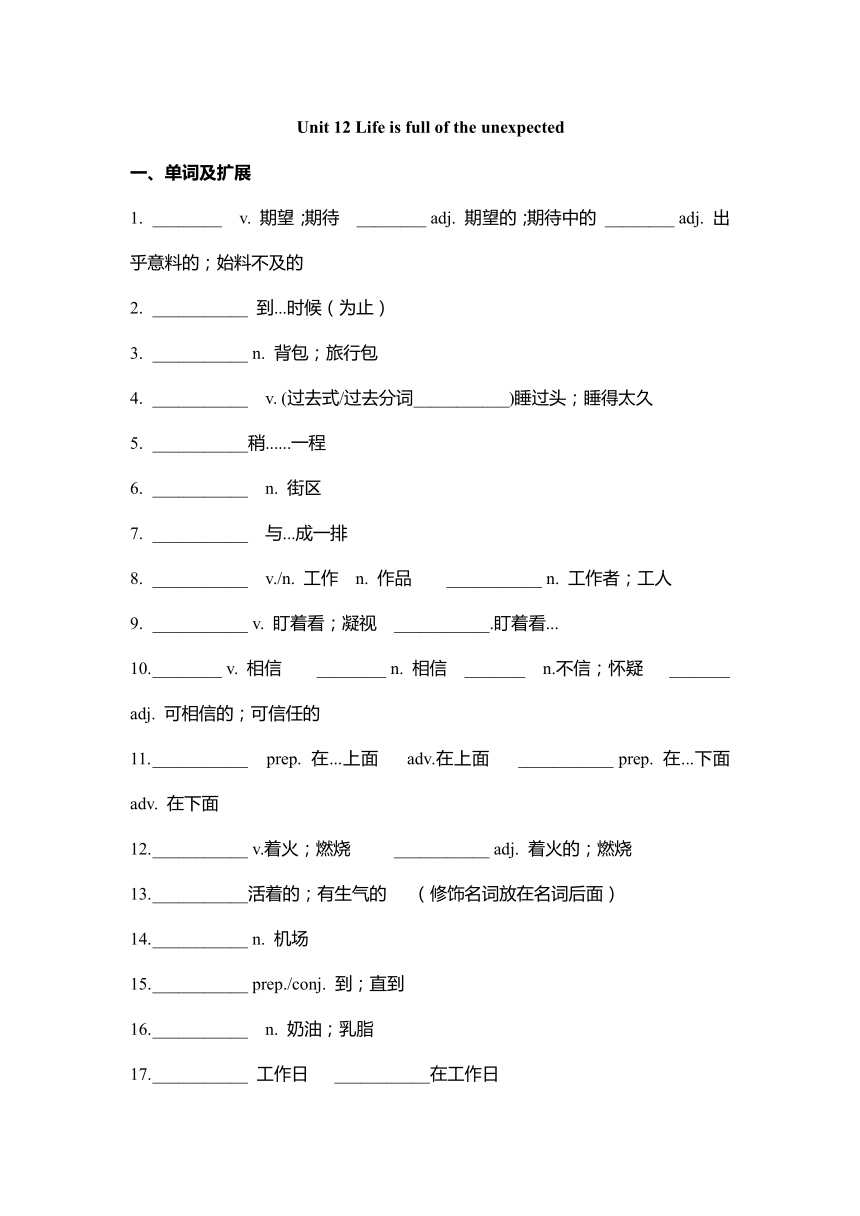 | |
| 格式 | docx | ||
| 文件大小 | 31.1KB | ||
| 资源类型 | 教案 | ||
| 版本资源 | 人教新目标(Go for it)版 | ||
| 科目 | 英语 | ||
| 更新时间 | 2024-01-15 11:19:07 | ||
图片预览

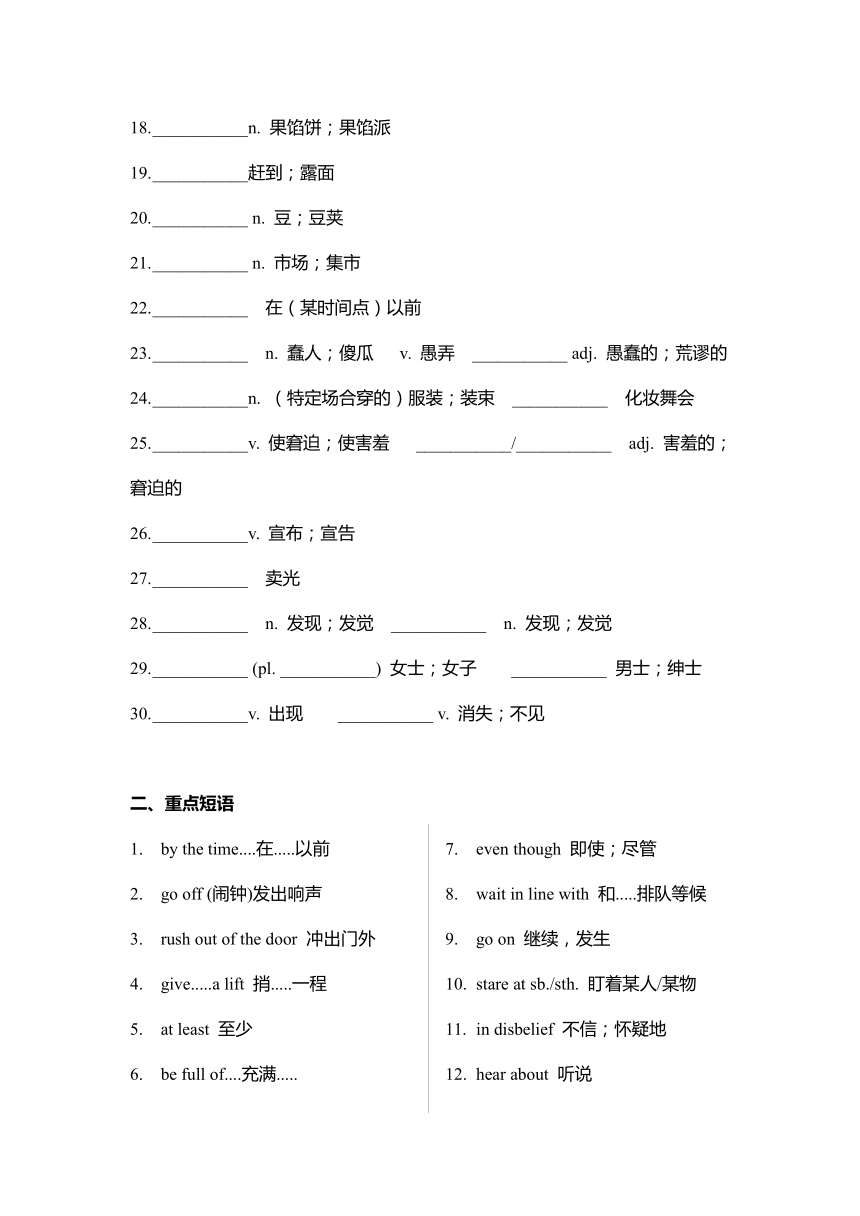
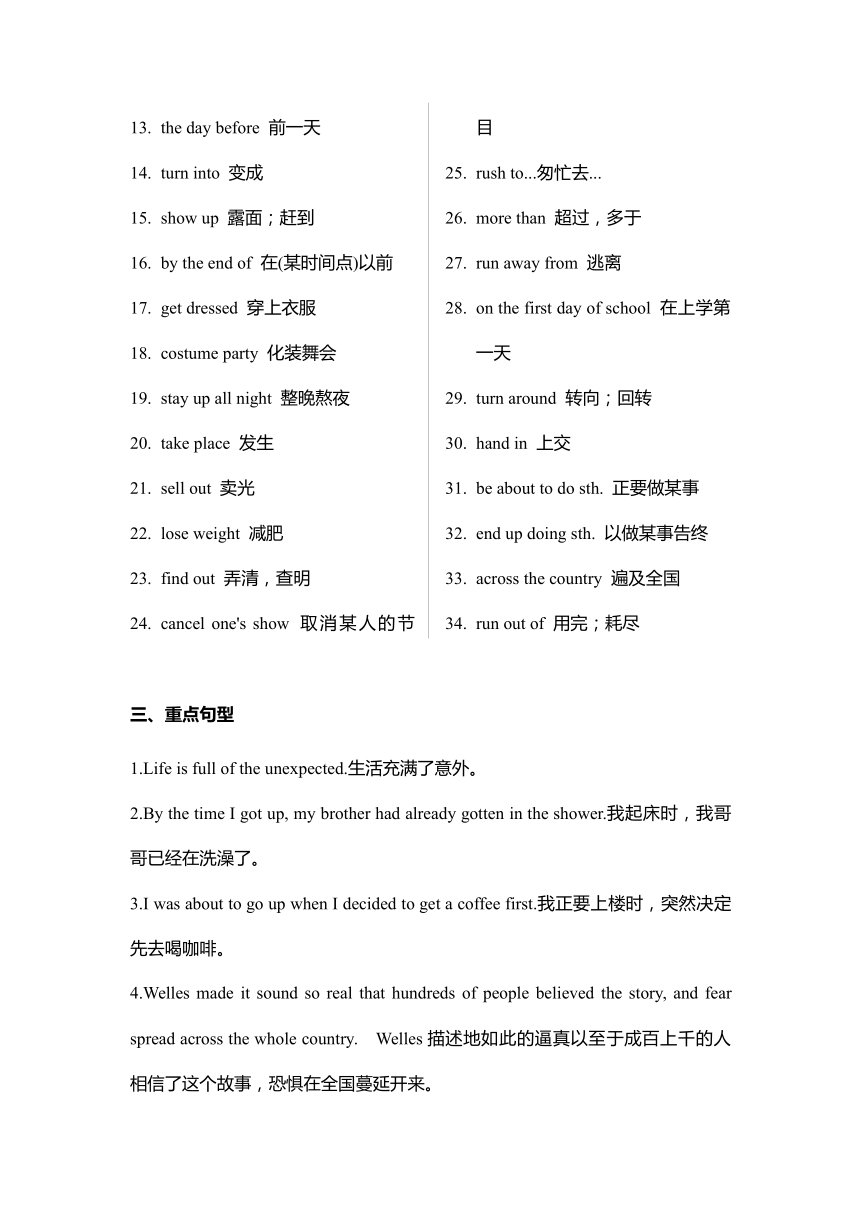
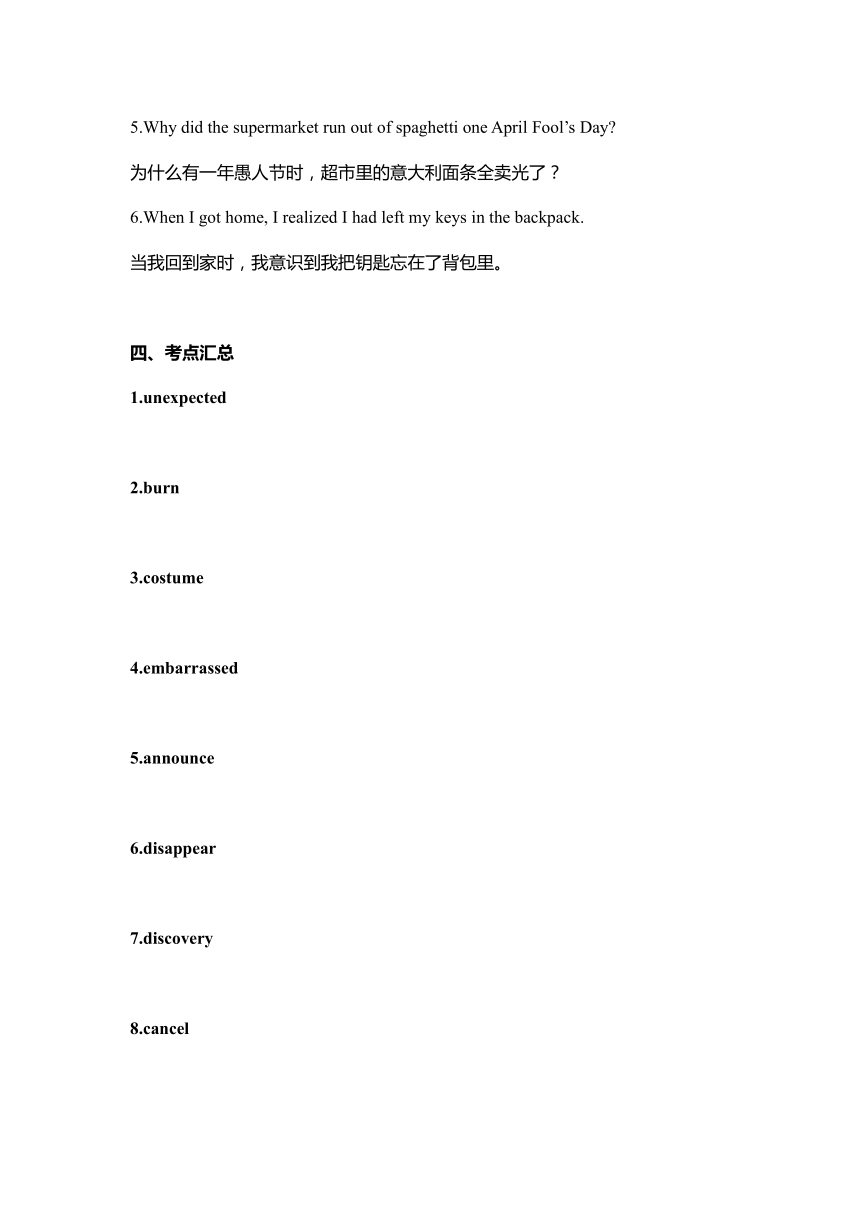
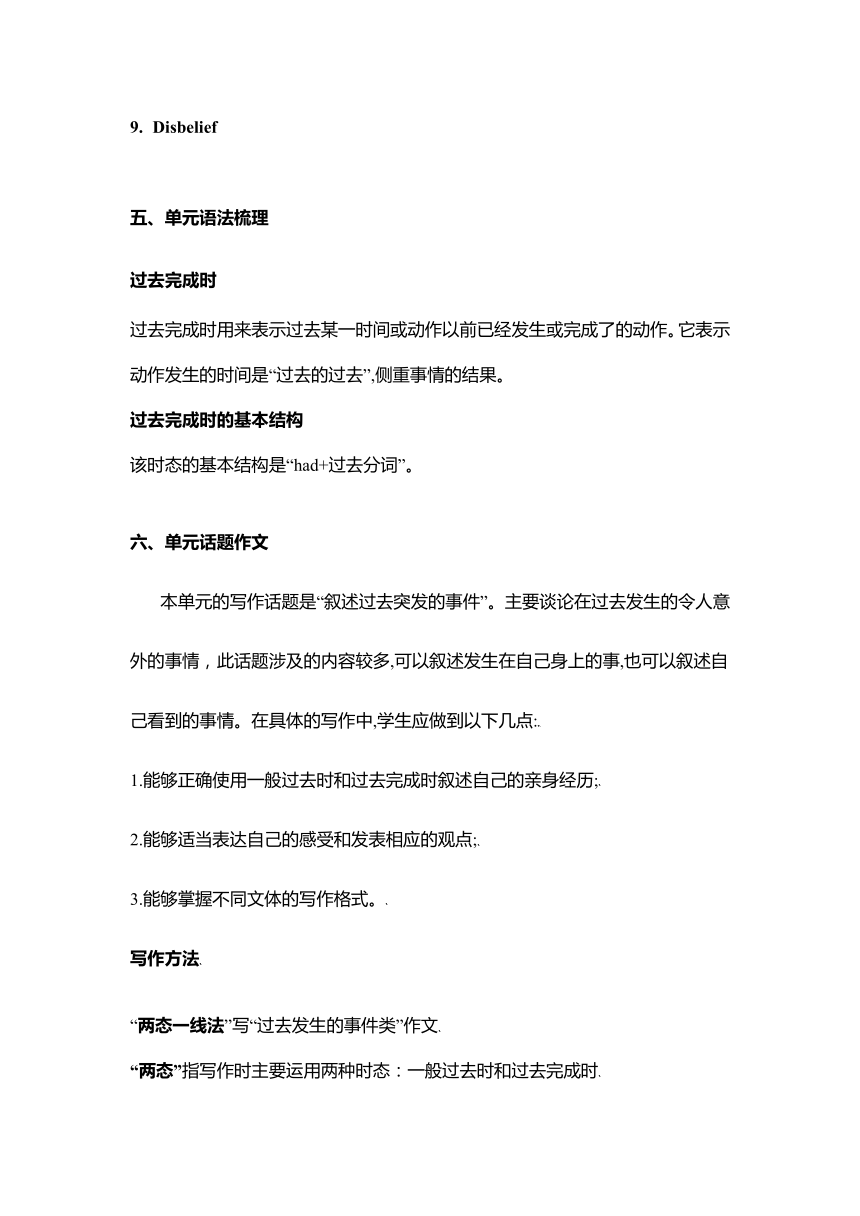
文档简介
Unit 12 Life is full of the unexpected
一、单词及扩展
________ v. 期望;期待 ________ adj. 期望的;期待中的 ________ adj. 出乎意料的;始料不及的
___________ 到...时候(为止)
___________ n. 背包;旅行包
___________ v. (过去式/过去分词___________)睡过头;睡得太久
___________稍......一程
___________ n. 街区
___________ 与...成一排
___________ v./n. 工作 n. 作品 ___________ n. 工作者;工人
___________ v. 盯着看;凝视 ___________.盯着看...
________ v. 相信 ________ n. 相信 _______ n.不信;怀疑 _______ adj. 可相信的;可信任的
___________ prep. 在...上面 adv.在上面 ___________ prep. 在...下面 adv. 在下面
___________ v.着火;燃烧 ___________ adj. 着火的;燃烧
___________活着的;有生气的 (修饰名词放在名词后面)
___________ n. 机场
___________ prep./conj. 到;直到
___________ n. 奶油;乳脂
___________ 工作日 ___________在工作日
___________n. 果馅饼;果馅派
___________赶到;露面
___________ n. 豆;豆荚
___________ n. 市场;集市
___________ 在(某时间点)以前
___________ n. 蠢人;傻瓜 v. 愚弄 ___________ adj. 愚蠢的;荒谬的
___________n. (特定场合穿的)服装;装束 ___________ 化妆舞会
___________v. 使窘迫;使害羞 ___________/___________ adj. 害羞的;窘迫的
___________v. 宣布;宣告
___________ 卖光
___________ n. 发现;发觉 ___________ n. 发现;发觉
___________ (pl. ___________) 女士;女子 ___________ 男士;绅士
___________v. 出现 ___________ v. 消失;不见
二、重点短语
by the time....在.....以前
go off (闹钟)发出响声
rush out of the door 冲出门外
give.....a lift 捎.....一程
at least 至少
be full of....充满.....
even though 即使;尽管
wait in line with 和.....排队等候
go on 继续,发生
stare at sb./sth. 盯着某人/某物
in disbelief 不信;怀疑地
hear about 听说
the day before 前一天
turn into 变成
show up 露面;赶到
by the end of 在(某时间点)以前
get dressed 穿上衣服
costume party 化装舞会
stay up all night 整晚熬夜
take place 发生
sell out 卖光
lose weight 减肥
find out 弄清,查明
cancel one's show 取消某人的节目
rush to...匆忙去...
more than 超过,多于
run away from 逃离
on the first day of school 在上学第一天
turn around 转向;回转
hand in 上交
be about to do sth. 正要做某事
end up doing sth. 以做某事告终
across the country 遍及全国
run out of 用完;耗尽
三、重点句型
1.Life is full of the unexpected.生活充满了意外。
2.By the time I got up, my brother had already gotten in the shower.我起床时,我哥哥已经在洗澡了。
3.I was about to go up when I decided to get a coffee first.我正要上楼时,突然决定先去喝咖啡。
4.Welles made it sound so real that hundreds of people believed the story, and fear spread across the whole country. Welles描述地如此的逼真以至于成百上千的人相信了这个故事,恐惧在全国蔓延开来。
5.Why did the supermarket run out of spaghetti one April Fool’s Day
为什么有一年愚人节时,超市里的意大利面条全卖光了?
6.When I got home, I realized I had left my keys in the backpack.
当我回到家时,我意识到我把钥匙忘在了背包里。
考点汇总
1.unexpected
2.burn
3.costume
4.embarrassed
5.announce
6.disappear
7.discovery
8.cancel
Disbelief
五、单元语法梳理
过去完成时
过去完成时用来表示过去某一时间或动作以前已经发生或完成了的动作。它表示动作发生的时间是“过去的过去”,侧重事情的结果。
过去完成时的基本结构
该时态的基本结构是“had+过去分词”。
六、单元话题作文
本单元的写作话题是“叙述过去突发的事件”。主要谈论在过去发生的令人意外的事情,此话题涉及的内容较多,可以叙述发生在自己身上的事,也可以叙述自己看到的事情。在具体的写作中,学生应做到以下几点:
1.能够正确使用一般过去时和过去完成时叙述自己的亲身经历;
2.能够适当表达自己的感受和发表相应的观点;
3.能够掌握不同文体的写作格式。
写作方法
“两态一线法”写“过去发生的事件类”作文
“两态”指写作时主要运用两种时态:一般过去时和过去完成时
“一线”指以发生在过去的事情为主线
练习
一、单项选择
1.—Bruce, you don't look well. ____________
—Driving in heavy traffic just now made me nervous.
A.How about you B.What happened C.Why not D.Guess what
2.____________you graduate, we will have been in Australia for one year.
A.By the time B.At the time C.In time D.On time
3.Please write down __________you can in your exercise books.
A.as much as words B.as much words as
C.as many words as D.as many as words
4.________, he got an "A" in the final exam.
A.Luck B.Lucky C.Luckily D.To lucky
5.What happened ______ you ______ December 20th
A.to, on B.with, in C.with, at D.to, at
6.—How long ________ the movie ________ when the students got there
—About 10 minutes.
A.has; begun B.had; begun
C.had; been on D.has; been on
7.Han Mei told me she ________ lunch, so she was very hungry.
A.has had B.hasn’t have
C.have had D.hadn’t had
8.By the end of 1976, many buildings ________ built in the city.
A.have been B.have C.had been D.will
9.She ________her keys in the office so she had to wait until her husband ________ home.
A.has left; comes B.had left; would come
C.had left; came D.left; had come
10.He asked me _____ during the summer holidays.
A.where I had been B.where I had gone
C.where had I been D.where had I gone
二、阅读
On December 24th, children around the world are waiting for Santa Claus(圣诞老人) to bring them gifts. But do you know that some people in China don’t like Christmas so much
Last month, 10 students from Tsinghua(清华), Peking and Renmin Universities said Santa Claus wasn’t welcome in China.
“Christmas is becoming more and more popular in China, while people do not talk much of traditional Chinese festivals, like the Spring Festival,” said the students in a letter.
They asked people to stop sending Christmas cards and buying gifts for their children. Instead, they said, we should spend more time on our own festivals.
There are people who have the same ideas. In Hunan, several people went out on the street on Christmas Day. They made poems and wrote Chinese calligraphy(书法). “We should care more about our own culture,” said one of them. But others have different ideas. “Having Christmas helps us know more about foreign cultures. It is good for us to make friends.” said Liu Yang, a 14-year-old boy from Shanghai. Another boy, Sun Long, 13, from Beijing said, “My school held a big party on Christmas Day. We played games and shared gifts with each other. I think we have got closer.”
1.On Christmas Eve, children are looking forward to ________ from Santa Claus.
A.money B.love C.gifts D.wishes
2.Who asked people to stop sending gifts to children
A.Santa Claus. B.10 university students.
C.Several people in Hunan. D.Chinese people.
3.Which of the following is the ten university students’ opinion
A.Christmas is a great festival for us. B.Christmas is not a great festival for foreigners.
C.We shouldn’t waste time having Christmas. D.We shouldn’t care about foreign culture.
4.Why do some Chinese like Christmas, according to the passage
A.Because they can learn more about foreign cultures.
B.Because they can write songs and poems.
C.Because they can send gifts to their children.
D.Because they can have more festivals around the year.
5.________ held a big party on Christmas Day.
A.Liu Yang’s school B.Sun Long’s school C.Tsinghua University D.Peking University
三、用所给单词的正确形式填空
1.Tim ________(oversleep)this morning and was late for school.
2.When I got to school, the bell had ________(ring).
3.The ________(work)are planting trees on both sides of the road.
4.Look at the smoke. Something must be ________ (burn).
5.We all became surprised when we heard of the ________ (expect) news.
6.If no one helps him, he may end up (be) a beggar.
7.Every year, there is a lively New Year (celebrate) in the city center.
8.We can't afford (go) abroad this summer. We need to do some part-time job to save enough money.
9.The boy ran home (get) his key.
10.Every morning, my son gets (dress) and has breakfast in a hurry.
四、根据汉语意思完成句子。
1.机不可失,时不再来。
Time or opportunity lost will return .
2.洗完澡后他迅速穿上了衣服。
He quickly after taking a shower.
3.——你怎么了,小明
——我昨天晚上熬夜准备期末考试了。
—What's wrong with you, Xiaoming
—I to prepare for the final exam last night.
4.他们回避了这个问题,希望它会自行消失。
They the problem, hoping that it would disappear on its own.
5.他已经用完了自己的钱。
He has his money.
6.当我到达学校的时候, 我才意识到我把书包忘在家里了。
When I got to school, I realized I ______ ______ my backpack at home.
7.到我返回学校的时候, 铃声已经响过了。
_____ _____ _____ I got back to school, the bell ______ _______.
8.我到达公共汽车站之前, 汽车已经离开了。
Before I _____ _____ the bus stop, the bus ______ _______ _______.
9.我决定先买一杯咖啡,然后再准备去办公室,
I ______ ______ ______ go up to my office when I decided to get a coffee first.
10.就在我和别的工作人员一起排队等候的时候,听到了一个巨大的声响。
As I ______ _______ ______ ______ with the other office workers, I ______ _____ _____ ______.
五、句型转换
14.Lucy went to bed after she finished her homework.(改为同义句)
Lucy go to bed she finished her homework.
2.The students were having a meeting when the teacher came in.(改为同义句)
The teacher came in the students were having a meeting.
3.He had studied Chinese for two years before he came here.(就划线部分提问)
had he studied Chinese before he came here
4.You haven't read the book. He hasn't read the book, either.(改同义句)
you nor he read the book.
5.My parents got married forty years ago.(改为同义句)
My parents ________ ________ ________ for forty years.
一、单词及扩展
________ v. 期望;期待 ________ adj. 期望的;期待中的 ________ adj. 出乎意料的;始料不及的
___________ 到...时候(为止)
___________ n. 背包;旅行包
___________ v. (过去式/过去分词___________)睡过头;睡得太久
___________稍......一程
___________ n. 街区
___________ 与...成一排
___________ v./n. 工作 n. 作品 ___________ n. 工作者;工人
___________ v. 盯着看;凝视 ___________.盯着看...
________ v. 相信 ________ n. 相信 _______ n.不信;怀疑 _______ adj. 可相信的;可信任的
___________ prep. 在...上面 adv.在上面 ___________ prep. 在...下面 adv. 在下面
___________ v.着火;燃烧 ___________ adj. 着火的;燃烧
___________活着的;有生气的 (修饰名词放在名词后面)
___________ n. 机场
___________ prep./conj. 到;直到
___________ n. 奶油;乳脂
___________ 工作日 ___________在工作日
___________n. 果馅饼;果馅派
___________赶到;露面
___________ n. 豆;豆荚
___________ n. 市场;集市
___________ 在(某时间点)以前
___________ n. 蠢人;傻瓜 v. 愚弄 ___________ adj. 愚蠢的;荒谬的
___________n. (特定场合穿的)服装;装束 ___________ 化妆舞会
___________v. 使窘迫;使害羞 ___________/___________ adj. 害羞的;窘迫的
___________v. 宣布;宣告
___________ 卖光
___________ n. 发现;发觉 ___________ n. 发现;发觉
___________ (pl. ___________) 女士;女子 ___________ 男士;绅士
___________v. 出现 ___________ v. 消失;不见
二、重点短语
by the time....在.....以前
go off (闹钟)发出响声
rush out of the door 冲出门外
give.....a lift 捎.....一程
at least 至少
be full of....充满.....
even though 即使;尽管
wait in line with 和.....排队等候
go on 继续,发生
stare at sb./sth. 盯着某人/某物
in disbelief 不信;怀疑地
hear about 听说
the day before 前一天
turn into 变成
show up 露面;赶到
by the end of 在(某时间点)以前
get dressed 穿上衣服
costume party 化装舞会
stay up all night 整晚熬夜
take place 发生
sell out 卖光
lose weight 减肥
find out 弄清,查明
cancel one's show 取消某人的节目
rush to...匆忙去...
more than 超过,多于
run away from 逃离
on the first day of school 在上学第一天
turn around 转向;回转
hand in 上交
be about to do sth. 正要做某事
end up doing sth. 以做某事告终
across the country 遍及全国
run out of 用完;耗尽
三、重点句型
1.Life is full of the unexpected.生活充满了意外。
2.By the time I got up, my brother had already gotten in the shower.我起床时,我哥哥已经在洗澡了。
3.I was about to go up when I decided to get a coffee first.我正要上楼时,突然决定先去喝咖啡。
4.Welles made it sound so real that hundreds of people believed the story, and fear spread across the whole country. Welles描述地如此的逼真以至于成百上千的人相信了这个故事,恐惧在全国蔓延开来。
5.Why did the supermarket run out of spaghetti one April Fool’s Day
为什么有一年愚人节时,超市里的意大利面条全卖光了?
6.When I got home, I realized I had left my keys in the backpack.
当我回到家时,我意识到我把钥匙忘在了背包里。
考点汇总
1.unexpected
2.burn
3.costume
4.embarrassed
5.announce
6.disappear
7.discovery
8.cancel
Disbelief
五、单元语法梳理
过去完成时
过去完成时用来表示过去某一时间或动作以前已经发生或完成了的动作。它表示动作发生的时间是“过去的过去”,侧重事情的结果。
过去完成时的基本结构
该时态的基本结构是“had+过去分词”。
六、单元话题作文
本单元的写作话题是“叙述过去突发的事件”。主要谈论在过去发生的令人意外的事情,此话题涉及的内容较多,可以叙述发生在自己身上的事,也可以叙述自己看到的事情。在具体的写作中,学生应做到以下几点:
1.能够正确使用一般过去时和过去完成时叙述自己的亲身经历;
2.能够适当表达自己的感受和发表相应的观点;
3.能够掌握不同文体的写作格式。
写作方法
“两态一线法”写“过去发生的事件类”作文
“两态”指写作时主要运用两种时态:一般过去时和过去完成时
“一线”指以发生在过去的事情为主线
练习
一、单项选择
1.—Bruce, you don't look well. ____________
—Driving in heavy traffic just now made me nervous.
A.How about you B.What happened C.Why not D.Guess what
2.____________you graduate, we will have been in Australia for one year.
A.By the time B.At the time C.In time D.On time
3.Please write down __________you can in your exercise books.
A.as much as words B.as much words as
C.as many words as D.as many as words
4.________, he got an "A" in the final exam.
A.Luck B.Lucky C.Luckily D.To lucky
5.What happened ______ you ______ December 20th
A.to, on B.with, in C.with, at D.to, at
6.—How long ________ the movie ________ when the students got there
—About 10 minutes.
A.has; begun B.had; begun
C.had; been on D.has; been on
7.Han Mei told me she ________ lunch, so she was very hungry.
A.has had B.hasn’t have
C.have had D.hadn’t had
8.By the end of 1976, many buildings ________ built in the city.
A.have been B.have C.had been D.will
9.She ________her keys in the office so she had to wait until her husband ________ home.
A.has left; comes B.had left; would come
C.had left; came D.left; had come
10.He asked me _____ during the summer holidays.
A.where I had been B.where I had gone
C.where had I been D.where had I gone
二、阅读
On December 24th, children around the world are waiting for Santa Claus(圣诞老人) to bring them gifts. But do you know that some people in China don’t like Christmas so much
Last month, 10 students from Tsinghua(清华), Peking and Renmin Universities said Santa Claus wasn’t welcome in China.
“Christmas is becoming more and more popular in China, while people do not talk much of traditional Chinese festivals, like the Spring Festival,” said the students in a letter.
They asked people to stop sending Christmas cards and buying gifts for their children. Instead, they said, we should spend more time on our own festivals.
There are people who have the same ideas. In Hunan, several people went out on the street on Christmas Day. They made poems and wrote Chinese calligraphy(书法). “We should care more about our own culture,” said one of them. But others have different ideas. “Having Christmas helps us know more about foreign cultures. It is good for us to make friends.” said Liu Yang, a 14-year-old boy from Shanghai. Another boy, Sun Long, 13, from Beijing said, “My school held a big party on Christmas Day. We played games and shared gifts with each other. I think we have got closer.”
1.On Christmas Eve, children are looking forward to ________ from Santa Claus.
A.money B.love C.gifts D.wishes
2.Who asked people to stop sending gifts to children
A.Santa Claus. B.10 university students.
C.Several people in Hunan. D.Chinese people.
3.Which of the following is the ten university students’ opinion
A.Christmas is a great festival for us. B.Christmas is not a great festival for foreigners.
C.We shouldn’t waste time having Christmas. D.We shouldn’t care about foreign culture.
4.Why do some Chinese like Christmas, according to the passage
A.Because they can learn more about foreign cultures.
B.Because they can write songs and poems.
C.Because they can send gifts to their children.
D.Because they can have more festivals around the year.
5.________ held a big party on Christmas Day.
A.Liu Yang’s school B.Sun Long’s school C.Tsinghua University D.Peking University
三、用所给单词的正确形式填空
1.Tim ________(oversleep)this morning and was late for school.
2.When I got to school, the bell had ________(ring).
3.The ________(work)are planting trees on both sides of the road.
4.Look at the smoke. Something must be ________ (burn).
5.We all became surprised when we heard of the ________ (expect) news.
6.If no one helps him, he may end up (be) a beggar.
7.Every year, there is a lively New Year (celebrate) in the city center.
8.We can't afford (go) abroad this summer. We need to do some part-time job to save enough money.
9.The boy ran home (get) his key.
10.Every morning, my son gets (dress) and has breakfast in a hurry.
四、根据汉语意思完成句子。
1.机不可失,时不再来。
Time or opportunity lost will return .
2.洗完澡后他迅速穿上了衣服。
He quickly after taking a shower.
3.——你怎么了,小明
——我昨天晚上熬夜准备期末考试了。
—What's wrong with you, Xiaoming
—I to prepare for the final exam last night.
4.他们回避了这个问题,希望它会自行消失。
They the problem, hoping that it would disappear on its own.
5.他已经用完了自己的钱。
He has his money.
6.当我到达学校的时候, 我才意识到我把书包忘在家里了。
When I got to school, I realized I ______ ______ my backpack at home.
7.到我返回学校的时候, 铃声已经响过了。
_____ _____ _____ I got back to school, the bell ______ _______.
8.我到达公共汽车站之前, 汽车已经离开了。
Before I _____ _____ the bus stop, the bus ______ _______ _______.
9.我决定先买一杯咖啡,然后再准备去办公室,
I ______ ______ ______ go up to my office when I decided to get a coffee first.
10.就在我和别的工作人员一起排队等候的时候,听到了一个巨大的声响。
As I ______ _______ ______ ______ with the other office workers, I ______ _____ _____ ______.
五、句型转换
14.Lucy went to bed after she finished her homework.(改为同义句)
Lucy go to bed she finished her homework.
2.The students were having a meeting when the teacher came in.(改为同义句)
The teacher came in the students were having a meeting.
3.He had studied Chinese for two years before he came here.(就划线部分提问)
had he studied Chinese before he came here
4.You haven't read the book. He hasn't read the book, either.(改同义句)
you nor he read the book.
5.My parents got married forty years ago.(改为同义句)
My parents ________ ________ ________ for forty years.
同课章节目录
- Unit 1 How can we become good learners.
- Section A
- Section B
- Unit 2 I think that mooncakes are delicious!
- Section A
- Section B
- Unit 3 Could you please tell me where the restroom
- Section A
- Section B
- Unit 4 I used to be afraid of the dark.
- Section A
- Section B
- Unit 5 What are the shirts made of?
- Section A
- Section B
- Review of Units 1-5
- Unit 6 When was it invented?
- Section A
- Section B
- Unit 7 Teenagers should be allowed to choose their
- Section A
- Section B
- Unit 8 It must belong to Carla.
- Section A
- Section B
- Unit 9 I like music that I can dance to.
- Section A
- Section B
- Unit 10 You're supposed to shake hands.
- Section A
- Section B
- Review of Units 6-10
- Unit 11 Sad movies make me cry.
- Section A
- Section B
- Unit 12 Life is full of the unexpected
- Section A
- Section B
- Unit 13 We're trying to save the earth!
- Section A
- Section B
- Unit 14 I remember meeting all of you in Grade 7.
- Section A
- Section B
- Review of Units 11-14
